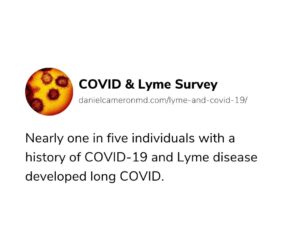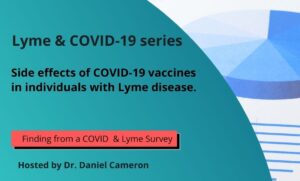
COVID-19 long haulers share similar experiences and frustrations with chronic Lyme disease patients in a commissioned report. “Anecdotally, there’s no question that there are a considerable number of individuals who have a post-viral syndrome that really, in many respects, can incapacitate them for weeks and weeks following so-called recovery and clearing of the virus,” writes Dr. Anthony Fauci. 2
COVID-19 long hauler symptoms can involve a broad range of systems. “[Patients] described multiple symptoms across respiratory, cardiovascular, urological, neurological/cognitive, dermatological, gastrointestinal, and musculoskeletal systems,” according to the report. 1
Patients’ symptoms may be dismissed or attributed to another illness. “During the July webinar, Fauci noted that some long haulers’ symptoms like brain fog and fatigue are ‘highly suggestive’ of myalgic encephalomyelitis/chronic fatigue syndrome (ME/CFS).” 2
Their ongoing illness can affect their mental health. “A consistent theme that emerges is the way Covid-19 can challenge people’s mental health, ranging from mild anxiety to post traumatic stress disorder.” 1
The severity of their symptoms has been dismissed. “A number of people said there were occasions when they thought they might not survive the night and there was anger at being labelled ‘mild cases’ simply because they didn’t access respiratory support in hospitals.” 1
There was a lack of a reliable diagnostic test. “The lack of empirical diagnostic tests may mean that a number of different conditions may be falling under a single umbrella term.” 1
“Anecdotally, there’s no question that there are a considerable number of individuals who have a post-viral syndrome that really, in many respects, can incapacitate them for weeks and weeks following so-called recovery and clearing of the virus,” writes Dr. Anthony Fauci.
Some doctors doubt the existence of an illness. “The widespread expectation that Covid-19 has an acute and a recovery phase was thought by all of the group to contribute to a perception of their stories of a different journey not being believed, either by health professionals, by employers, or indeed by friends and family.” 1
Some patients doubt their own illness. “It’s a crafty illness, and it’s a doubting illness because, it makes you doubt yourself and it makes people doubt you. My symptoms started in February but when you think you’re over it, then you start to get a bitter taste, then a few days later the fatigue comes back.” 1
It’s a roller coaster illness with ups and downs. “It’s a roller coaster rather than an incline, I’m going up and down and up and down. If I do too much I feel worse, and if I don’t do enough I feel worse and so when I feel better I have to bank the energy.” 1
Some patients have problems accessing health care. “Most Covid patients are no longer infectious after 2 – 3 weeks, but many of us are refused access to healthcare if we still have symptoms, which may last for months.” 1
It can be hard to convey symptoms. “The group described challenges with accessing primary care. Many had only had telephone contact and even those who had had video consultations found that they were inadequate for conveying the nature of their symptoms.” 1
There can be cycles of symptoms. “I currently feel I am living in a ‘Covid’ cycle of symptoms (fever, cough and metallic taste), extreme fatigue and brain fog, then a few days of normality. Slowly, after nearly six months I am slowly beginning to see more ‘normal’ days but as soon as I begin to feel better the cycle starts again.” 1
Editor’s Note: It has to be frustrating for long haulers, who have had to face the same issues as some Lyme disease patients. I hope future research will provide an answer for long hauler COVID-19 patients and a greater understanding that will also benefit patients struggling with persistent Lyme disease.
For a comprehensive overview of the Long COVID and Lyme disease connection—including my peer-reviewed research on 889 patients—see Long COVID and Lyme Disease: What Patients Need to Know.
Related Articles:
Long COVID and Lyme Disease: What Patients Need to Know
COVID-19 long-haulers and Lyme disease patients
Brain fog in COVID-19 and Lyme disease patients
9 ways COVID-19 and Lyme disease can look alike
References:
- Living with Covid19. from The National Institute for Health Research. https://evidence.nihr.ac.uk/themedreview/living-with-covid19/#Commissioned Last accessed 1/16/21.
- Rubin R. As Their Numbers Grow, COVID-19 “Long Haulers” Stump Experts. JAMA. Sep 23 2020;doi:10.1001/jama.2020.17709
- Tenforde MW, Kim SS, Lindsell CJ, et al. Symptom Duration and Risk Factors for Delayed Return to Usual Health Among Outpatients with COVID-19 in a Multistate Health Care Systems Network – United States, March-June 2020. MMWR Morb Mortal Wkly Rep. Jul 31 2020;69(30):993-998. doi:10.15585/mmwr.mm6930e1


